Voices from Beyond (1991)
Directed by: Lucio Fulci
Written by: Daniele Stroppa, Lucio Fulci, Piero Regnoli
Starring: Duilio Del Prete, Karina Huff, Lorenzo Flaherty, Pascal Persiano
AKA VOCI DAL PROFONDO
Italy
AVAILABLE ON DVD
RUNNING TIME: 91 mins
REVIEWED BY: Dr Lenera, Official HCF Critic
Wealthy businessman Giorgio Mainardi dies of a stomach hemorrhage, but his ghost is not so sure that it was a random misfortune and wants to know the truth. Unfortunately, almost everyone around him is happy to see him gone. Everyone, that is, except for his daughter Rosie, who still feels affection for her father even though they had drifted apart. However, communication between the dead man and his daughter is dependent on the decay of his corpse – the more he rots, the weaker the link of communication. Will they discover who murdered him in time?.…
I’m a little late posting my latest Lucio Fulci review seeing as I’m trying to do these monthly, but there shall hopefully be another one in two or three weeks time because it’s of a very fine film that’s coming out on UK Blu-ray. It seems like I’ve been doing these for ever, but Fulci did make a lot of films, and I’m probably only about half way through them. The last entry Conquest was not a horror, and nor will the next one be, but Voices From Beyond can certainly call itself of that genre even though it sort of combines it with soap opera. That doesn’t sound too promising perhaps, and I wasn’t expecting much considering the lukewarm-to-poor quality of Fulci’s later output that I’ve seen [I haven’t seen it all yet]. But actually this is a rather interesting movie and seems to me to be a very personal one from its director. A Cat In The Brain prior to this had Fulci looking at himself and his legacy, but was very much hampered by being often poorly put together and not seeming to decide on what it was attempting to say. But Voices From Beyond, which is more concerned with the ‘personal’ than the ‘public’, seems to know exactly what it’s about, its plot not at all disguising what seem to be a cry for redemption from a man staring into the abyss of death, Fulci himself slowly dying of diabetes at the time. And probably because of this, Fulci’s direction and the overall level of competency make it his best looking, best made film in a long time, with little of the sloppiness fans had sadly come to expect by now from the man’s work, and his technicians seriously rising to the challenge. There are unsurprisingly still a few awkward and silly moments that betray what was still a rushed and very cheap production, and even considering Fulci’s fondness for slow pacing it seems to give the impression that it’s going to eventually speed up and it never does. But overall I was most pleasantly surprised by it. Despite constant illnesses, little money and being trapped in a genre that he certainly liked but clearly wanted breaks from to do other subjects, Voices From Beyond shows that Fulci could Still Do It.
For the first time in my Fulci series I have little production information to give you, despite even owning a book about Fulci. But at least I can probably provide a sense of where his career was at at the time. After surviving near death, he hurled himself into making horror films, but the old panache was gone and he even found himself making TV movies and putting his name on [Lucio Fulci Presents!] other people’s horror movies of dubious quality, while some of his work wasn’t even considered worthy of release for quite a long time. After the rock bottom of the inept Demonia, Fulci had a deeper involvement in Voices from Beyond. It was based on a short story written by Fulci himself that was published in the Gazetta di Firenze, and later included in an anthology of his short stories titled Le lune nere. The story was written with the intention of developing it into a screenplay, and Daniele Stroppa contributed to the expansion of the tale, though it was his Demonia collaborator Piero Regnoli to whom he [why?] turned to aid him with the screenplay. The Florence shoot made use of a villa that was once owned by Luchino Visconti. Unusually, every cast member spoke English, though of course only to be dubbed into Italian and then English by others. Fulci on the film, “I love it very much. It’s a wonderful movie with the wrong cast”. Seeing as it was another TV movie, it got little attention, though it was the first Fulci since 1986’s Aenigma to get a video release in the US and the UK.
The opening scene, entitled ‘Prologue’, immediately lets you know that is a somewhat different class of movie to Fulci’s last few; it’s strikingly shot, highly atmospheric, and has a real scary and nasty streak to it without lapsing into that mocking tone that had sadly began to become a feature of Fulci’s attempts at being horrific. We see two people having sex, but a child’s voice keeps on crying, “Mummy, Mummy”! It understandably puts a damper on things, but it’s no reason for the guy to grab a knife and come very close to stabbing the poor lad, before slashing to death the Winnie the Pooh illustration [how low can he get?] on the pillow beside him. The fact that the pillow bleeds alerts you to the fact that this could be a dream, which indeed it turns out to be when the woman wakes up screaming. Then we see Giorgio die amidst loads of coughed up blood before the first of several instances where we hear the voice of his ghost, “What did they do to me”? Many movie lovers will immediately think of the beginning of Sunset Boulevard, though I reckon Fulci and his other writers were more inspired by the stunning 1971 giallo Short Night Of Glass Dolls where a man cannot move or speak and is therefore presumed dead but is most definitely alive. Hearing the ghost’s voice-over doesn’t quite work in this movie and some viewers may laugh. Anyway, the doctor’s diagnosis of death is an internal hemorrhage. Giorgio’s family mostly seem pleased that he’s dead, and we are able to spot the killer or one of the killers almost immediately due to not just the obvious over-acting of the person playing the role but the way that the character is lingered upon by the camera. Despite Fulci’s claim that the performance was entirely to blame for giving the game away, I have a sneaking suspicion that Fulci, who often twisted ‘facts’ to make himself look better, was trying to be like one of his favourite directors Alfred Hitchcock and go for the “suspense over surprise” route, much like when Vertigo gave away its ‘twist’ two thirds of the way through to provide more tension and psychological richness. This ‘revelation’ doesn’t really damage Voices From Beyond, especially because a few more surprises are in store.
Giorgio’s daughter Rosie arrives at the Mainardi estate having taken a leave of absence from her college studies to attend the funeral and for the reading of the will. She soon finds her entire family squabbling over the estate. Giorgio’s stepmother Hilda refuses permission for an autopsy, and taunts her elderly husband, Giorgio’s father Paolo, who is near death himself from a recent stroke and is unable to move or speak. Meanwhile, Hilda’s son Mario is having an affair with Giorgio’s third wife Lucy. At the funeral, each of the family mourners think back to their relationship with the dead man. Lucy remembers his anger at her frigidity; Mario recalls how Giorgio humiliated and insulated him after he asked for financial help in obtaining a business position; Hilda fumes over Giorgio ordering the bank not to let her cash the checks from his sick fathers account, and Rita, Giorgio’s mistress, remembers Giorgio rudely breaking off their secret affair. Few people are happy when the reading of the will reveals that Giorgio left Rosie everything. Some time is spent with all this, but one is increasingly involved as Giorgio’s spirit remains conscious after death and from his buried coffin. He tries to communicate with Rosie, eventually succeeding by entering her dreams and then entreating her to discover who in the family was responsible for his death. He can also give the others nightmares, meaning that quite a bit of the film takes place in the world of dreams, allowing for some of Fulci’s most striking scenes in ages, notably a meeting in a surreal restaurant replete with bones, spirals, hideous dummy waiters and eyes appearing out of pouched eggs [Fulci’s final eye gag!] only to be stabbed, and a walk down a corridor full of coffins on either side out of which – yes! – zombies burst out in what is this director’s last living dead sequence, and it’s a goodie, even if it doesn’t deliver the extreme gore that you might expect.
There’s a rather ‘unprofessional’ autopsy [look out for Fulci’s final cameo], and us being asked to believe that somebody is able to sneak into a hospital and smash a jar in a laboratory containing samples. Rosie refuses to go to the police for the lame excuse that “they won’t understand anything” even when an attempt is made on her life – though she’s probably taken the sensible decision not to listen to her boyfriend Tommy [Gianni in the Italian version] who early on nicely tells her to, “Just stop being dramatic about this”. And, while the final scene gives us the great thought of villains being punished for ever and ever in their dreams, the film doesn’t really have a climax. Still, Fulci seems genuinely involved, and it’s hard not to think of him throughout seeing as he was notoriously rude to many yet who had a very close relationship with his daughter Camilla. There are moments of real tenderness, such as Giorgio taking Rosie on a trip to a lake where they used to spend a lot of time when she was a child. Jesus, Fulci is veering close to sentimentality here – and you know what? – it’s great! Then there’s the really moving bit where Paolo is crying and attempting to say who the killer is. And yet the spectre of death is all over this film; for its first half the camera can’t seem to keep away from tombs and coffins for more than a moment. What we have here is Fulci confronting, and trying to come to terms with, what is inevitably coming – while also admitting that he hasn’t really been very nice. Alessandro Grossi’s cinematography is line with this; while often very lush, just look out for the number of shots where black seems to be swallowing everything else. Some thought and care was really been put into making this film. While he can’t show graphic violence, Fulci can dwell on Giorgio’s decay which becomes delightfully gross, and his explanation of ghosts is fascinating. Here, they can continue to exist only as long as their physical image remains – that is, either until their bodies decay beyond recognition, or until their image has faded in the minds of those that choose to keep their memory [whether out of love or hate] alive.
Karina Huff only sometimes shows the emotion that her character ought to be showing, but everyone else is fine with one notable and afore-mentioned example that I won’t mention just in case you’re a worse movie detective than I am. There’s a solid, if less ‘lounge’-style than usual, late music score by Stelvio Cipriani to enjoy. The beat tracks sometimes threaten to actually speed up the pace of the very sedate film, and two more emotive pieces work well too. Voices From Beyond is certainly not the film to begin with if you’re new to Fulci; if you do, you’ll probably be puzzled in the wrong way and wonder what all the fuss is about. But it would have been a suitable closure to his career, though he actually had one more film left – Door To Silence which seems generally considered to be terrible but which is also very much about death – and he was planning Wax Mask with no less than Dario Argento when he died. But I found Voices From Beyond to be surprisingly rewarding and even poignant, the latter including its strange dedication which comes up at the end. The closing title card reads:“This film is dedicated to my few real friends, in particular to Clive Barker and Claudio Carabba – Lucio Fulci”. We all know who Barker is, but Carabba? This movie can be read as a parable of the link the living share with the dead, and it got me to ponder on the many issues of mortality like many of the really great horror films and indeed horror literature [though it may not initially seem obvious, this film is very close to Edgar Allan Poe and H. P. Lovecraft in mindset], but without actually depressing me. After all, its overriding message seems rather positive. We can let go of the deceased – since they are always with us anyway.
Rating: 










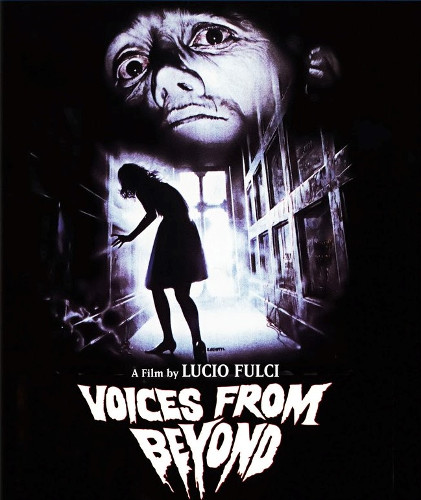
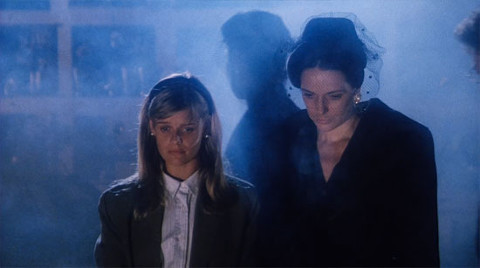
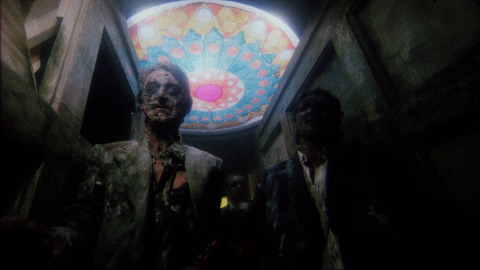

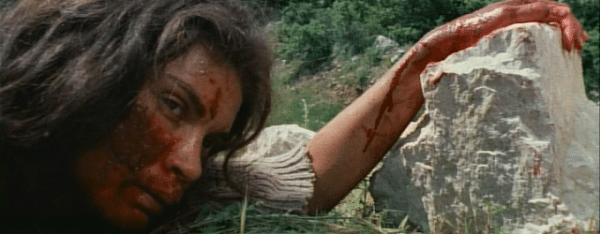
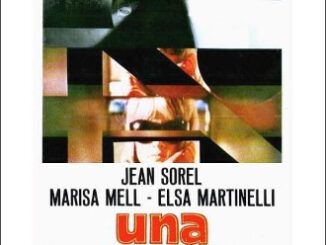
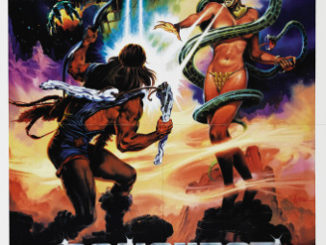
Be the first to comment